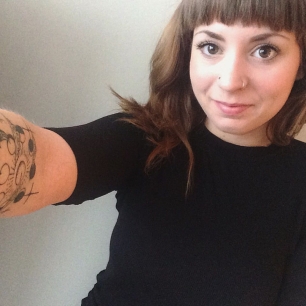As feminism continues to grow so should our vocabulary
by Sarah Foot
Like any field, feminism continues to flourish and adapt as time passes. Addressing new concepts, old issues, and emerging ideas, the language we use is a huge part of this growth. Our expanding feminist vocabulary is important because – to put it simply – it shows we are learning. Social justice is hinged on the principles of inclusion, and so is feminism.
Mainstreaming of emerging terms and ideas is important for all feminisms. This year, we saw an increase in trans* rights politics, women of colour, and pop-culture feminism. From Amandla Stenberg challenging cultural appropriation to Laverne Cox being a powerful, visible woman, 2015 was a great year for diverse feminisms to take the spotlight.
Here are seven terms you need to add to your feminist tool belt in 2016.
Intersectional
Intersectionality is the idea that multiple systems of oppression and privilege are present and unique in every person’s life. For example, as a woman I experience sexist oppression, but am also privileged in Canadian society by being born white. Intersectionality acknowledges the often complicated relationships and lives we all lead and how that may hinder our movement in society. Intersecting identities like race, sex, gender, ability, sexual orientation, and class are some examples of how unique combinations of each would affect livelihood and discrimination/domination associations.
Gender-fluidity
Persons who identify as gender fluid prescribe to being neither fully male nor female. Instead, it is the rejection of the rigid idea of a gender binary as divisive. Oftentimes, gender-fluidity is expressed as navigating the spectrum of gender, bouncing from masculine to feminine, or combining the two. Gender fluidity is different than genderlessness because, unlike being genderless, it recognizes the ideas of male and female as two opposing concepts.
Transphobia & TERFS
Unfortunately, these needed to be included. Transphobia is exactly what it sounds like – the fear and hatred (either openly or in microaggressions) against the trans community or individuals. It can include anything from hypersexualization, to using improper pronouns, to exclusion from one’s chosen gender grouping. Which brings us to TERFs. Trans Exclusionary Radical Feminists are a special crew all in their own. In short, this small community believes that trans women are not “actually women,” and the same applied to trans men. Instead, they prescribe to a radical version of feminism which tethers the biological concept of sex to gender and believe only those with physical vaginas can experience sexism, and thus be women. Thankfully, this group is small (and threatened) due to the wonderful work of visible trans women.
Cis
You’ve probably seen some posts on this mysteriously brief term. Cis is the shortened version of cisgender, which applies to anyone that aligns their gender to their sex. Cis men and women experience varying degrees of privilege over alternative gender identities based on society’s historical recognition of the gender-sex pairing. Cis people, on the other hand, often deal with the pressures of living up to “masculine” or “feminine” ideals.
Womyn
The spelling of ‘women’ with a y is an emerging trend in feminist circles and literature. Womyn disrupts the idea that men are still central to women. It may seem like a small idea – what can a spelling anomaly make? Those that prescribe to the term believe it’s a subtle way to dissociate women’s and men’s experiences, acknowledging the unique sexism each group deals with, especially womyn.
Misogynoir
Misogynoir is the word used to describe sexism specifically targeted against black women. Women of colour experience gender and race oppression in ways that differ dramatically from white women. Misogynoir is best exemplified by the use of stereotypes that contribute to increased pigeonholing in society-at-large. Some of these are “ratchet” or “angry black woman,” relying on negative ideas rather than positive ones. Misogynoir – and the experiences of women of colour – often gets overlooked in mainstream feminist theory as white women have historically had a larger platform to advocate for rights and equality.
“Problematic”
The word “problematic” is an internet feminist term that has gotten widely popular this past year. Its use seeks to point out characters or people that have subtle discriminations. Usually it’s phrased as, “Your favourite is problematic.”
“Problematic” is, itself, problematic. It contributes to call-out culture that refuses to provide a solution. Thrown around, it doesn’t acknowledge that internalization is a process each person experiences – so we are all problematic in one way or another. No feminist emerges from the womb fully realized without prejudices. Being “problematic” is a symptom of cultures that oppress. By continuing the learning experience, we have the power to slowly dissect and remove these parts within ourselves and society.
A new year means 365 more days for us – and our feminisms – to grow. As we move forward, what’s most important is that we recognize the vast versions of feminism out there and that as long as they’re striving towards equality and understanding of all genders, they are valid.

Sarah is a sass-filled writer and editor with an unapologetic obsession with bunnies. Catch her talking intersectionality, music your mom hates and crushes on ’90s hunks through your social media stream of choice.



